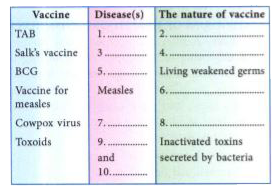A disease against which vaccination is resorted only during epidemics
Diarrhoeal disease
Tetanus
Cholera
Taeniasis
The correct Answer is:C
Step-by-Step Solution:
1. Understanding the Question: The question asks for a disease that requires vaccination only during epidemics. This means we are looking for a disease that does not have a routine vaccination schedule but is vaccinated against when there is a sudden outbreak.
2. Analyzing the Options:
- A. Diarrheal diseases: This is a broad category and does not specify a particular disease. Vaccination is not typically used for all diarrheal diseases.
- B. Tetanus: Tetanus has a regular vaccination schedule (DTP vaccine) and is not limited to epidemics.
- C. Cholera: Cholera is caused by the bacterium Vibrio cholerae and can lead to severe dehydration due to profuse watery diarrhea. The vaccine for cholera is typically administered during outbreaks or epidemics.
- D. Tinnitus: Tinnitus is not a disease that is preventable by vaccination; it is a symptom rather than an infectious disease.
3. Identifying the Correct Answer: Among the options, cholera is the only disease for which vaccination is specifically recommended during epidemics. The cholera vaccine provides temporary immunity, lasting about six months, which aligns with the need for vaccination during an outbreak.
4. Conclusion: Therefore, the correct answer to the question is C. Cholera.
---
- A. Diarrheal diseases: This is a broad category and does not specify a particular disease. Vaccination is not typically used for all diarrheal diseases.
- B. Tetanus: Tetanus has a regular vaccination schedule (DTP vaccine) and is not limited to epidemics.
- C. Cholera: Cholera is caused by the bacterium Vibrio cholerae and can lead to severe dehydration due to profuse watery diarrhea. The vaccine for cholera is typically administered during outbreaks or epidemics.
- D. Tinnitus: Tinnitus is not a disease that is preventable by vaccination; it is a symptom rather than an infectious disease.
Topper's Solved these Questions
- HUMAN HEALTH AND DISEASEBOOK - DINESH PUBLICATION ENGLISHCHAPTER - HUMAN HEALTH AND DISEASEEXERCISE - Revision Questions From Competitive Exams
512 Videos
- HUMAN HEALTH AND DISEASEBOOK - DINESH PUBLICATION ENGLISHCHAPTER - HUMAN HEALTH AND DISEASEEXERCISE - CHECK YOUR GRASP
17 Videos
- HUMAN EVOLUTIONBOOK - DINESH PUBLICATION ENGLISHCHAPTER - HUMAN EVOLUTIONEXERCISE - Brain Teasers-VII
181 Videos
- HUMAN REPRODUCTIONBOOK - DINESH PUBLICATION ENGLISHCHAPTER - HUMAN REPRODUCTIONEXERCISE - MCQ
770 Videos
Similar Questions
Knowledge Check
Read the following statements and select the correct ones.
(i) Vaccine is a preparation (or suspension ) of a dead/attenuated pathogen of a disease which on inoculation ( or injection ) into a healthy person, provides temporary/permanent active immunity by inducing antibodies formation.
(ii) Immunisation is the process by which the body produces antibodies against the vaccine preventable diseases through administration of specific vaccines.
(iii) The principle of immunisation or vaccination is based on the property of 'memory' of the immune system.
iv) If a person is infected with some deadly microbes to which quick immune response is required; in that case, we need to directly inject the performed antibodies or antitoxins e.g., in case of tetanus.A(i) and (ii)B(iii) and (iv)C(i), (ii) and (iii)D(i),(ii),(iii) and (iv)
Toxoid is used in vaccination against
View SolutionName the diseases against which DPT vaccine develops immunity.
View SolutionThe animal in which testis descent into scrotum only during breeding season
View SolutionName two diseases against which genetically engineered vaccines are available.
View SolutionGiven below is a table of certain vaccines, the diseases against which they are used and the nature of vaccine. Fill up the gaps 1 - 10.

View SolutionWho discovered 'vaccine' for the first time? Name two diseases which can be prevented by using vaccines.
View SolutionAssertion: Interferons are effective against viruses.
Reason: Proteins which can be synthesised only be genetic engineering are effective against viruses.
View Solution
